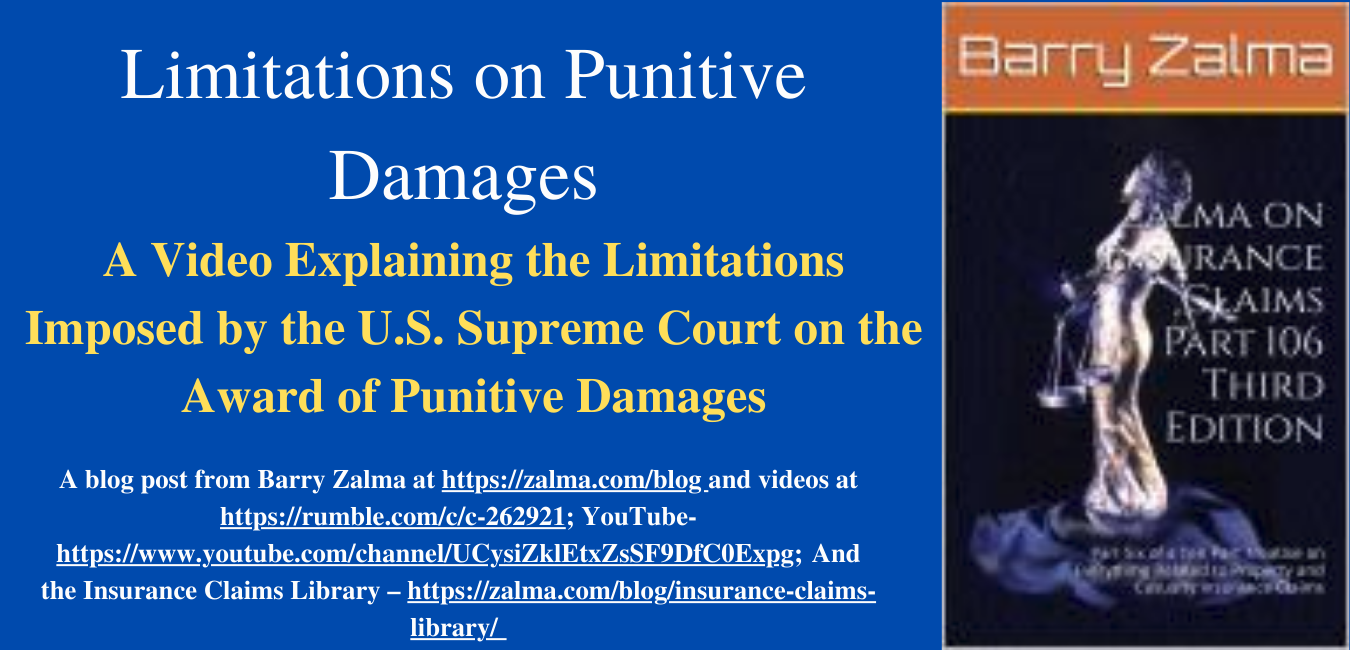-
News Feed
- EXPLORE
-
Pages
-
Groups
-
Events
-
Blogs
-
Marketplace
-
Offers
-
Jobs
-
Developers
Limitations on Punitive Damages

A Video Explaining the Limitations Imposed by the U.S. Supreme Court on the Award of Punitive Damages
Read the full article at https://www.linkedin.com/pulse/limitations-punitive-damages-barry-zalma-esq-cfe and see the full video at https://rumble.com/vnv3fc-limitations-on-punitive-damages.html and at https://youtu.be/98CKBXxzaiM and at https://zalma.com/blog plus more than 3950 posts.
The US Supreme Court has restricted the extent of available punitive damages in State Farm Mutual Automobile Insurance Co. v. Campbell, 123 S.Ct. 1513, 155 L.Ed.2d 585 (U.S. 2003), where it overturned a $145 million verdict against an insurer. It said that a punitive damages award of $145 million is excessive and violates the Due Process Clause of the Fourteenth Amendment. By reducing the exposure to excessive and debilitating punitive damages claims professionals can hope the Supreme Court’s ruling gives insurers more courage to fight insurance fraud since their exposure to punitive damages is limited. Regardless, Campbell allows recovery of punitive damages for tortious breach of the insurance contract and the tort of bad faith.
The Campbell case arose out of an automobile accident where one party was killed and another severely injured. The Campbells, insured by State Farm, attempted to pass six vehicles on a two-lane highway, failed, and caused the driver of an oncoming car to drive off the road to escape collision with the Campbells’ vehicle. The Campbells only had $25,000 coverage per person and $50,000 in the aggregate. The Campbells felt they were not at fault because there was no contact between the two vehicles. State Farm ignored the advice of its adjuster and counsel to accept policy limits demands and took the case to trial. The verdict at trial was over $180,000 and the State Farm-appointed counsel told the Campbells to put their house on the market since they would need the money to pay the verdict. State Farm refused to pay the judgment to fund an appeal. The Campbells retained personal counsel to pursue an appeal that was not successful, entered into a settlement with the plaintiffs where the plaintiffs agreed to not execute on their judgment in exchange for an assignment of 90% of all money received in a bad faith action by the Campbells against State Farm. Before suit was filed, State Farm paid the full judgment.
At trial the plaintiffs brought in evidence of actions of State Farm in first party cases across the country, in third party cases not similar to the Campbells’ auto accident, and other evidence not related to the facts of their case.
The Supreme Court found that State Farm’s “handling of the claims against the Campbells merits no praise,” but concluded “a more modest punishment could have satisfied the State’s legitimate objectives.
© 2021 – Barry Zalma
We are 100% funded for October.
Thanks to everyone who helped out. 🥰
Xephula monthly operating expenses for 2024 - Server: $143/month - Backup Software: $6/month - Object Storage: $6/month - SMTP Service: $10/month - Stripe Processing Fees: ~$10/month - Total: $175/month
- Art
- Causes
- Crafts
- Crime
- Dance
- Drinks
- Film
- Finance
- Fitness
- Food
- Games
- Gardening
- Health
- Home
- Literature
- Music
- Networking
- Paranormal
- Other
- Politics
- History
- News
- Party
- Science
- Religion
- Shopping
- Sports
- SyFy
- Politically Incorrect
- Philosophy
- Theater
- Technology
- Wellness



